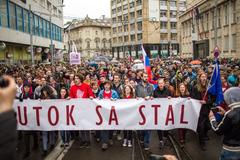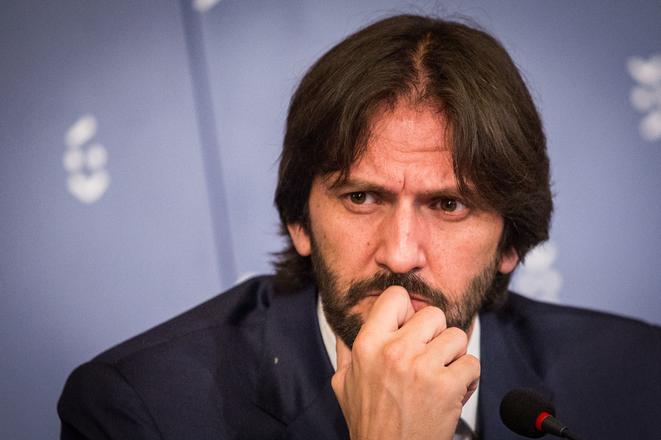A new client centre that was opened on Tomášikova street in Bratislava on February 1, 2016 was supposed to be a symbol of simple and convenient bureaucracy, friendly towards citizens.
It handles the agenda of state citizenship, trade licences; issues IDs and drivers’ licences, and manages the verification of documents and signatures, all in one place.
Yet, “the client centre will become a symbol of clientelism, not of service” independent MP Miroslav Beblavý wrote on his Facebook page after the ministry started to use the building in February 2015.
Beblavý was then claiming that the Interior Minister was avoiding a competition by renting and planning to purchase the building for a total price of €12.75 million, without a public procurement.
Two years later, the Office for Public Procurement (ÚVO) ultimately stated that the ministry unlawfully avoided the competition. The office now has 30 days to decide whether the ministry will pay a fine as set by law at 5 percent of the public procurement’s value, which is around €260,000.
Interior Minister Robert Kaliňák responded that he respects the ÚVO’s decision but disagrees with it and refuses to leave his seat.
“If they will launch administrative action [about the fine] we will adequately defend ourselves and inform you about every detail,” Kaliňák said during a May 12 press conference.
Meanwhile, he is also facing accusations that the Interior Ministry accepted an unfavourable agreement on exchanging lucrative plots for four apartments for police officers.
Smer and its coalition partners, Most-Híd and the Slovak National Party (SNS) have not demanded Kaliňák’s resignation.

Acquiring the building
The Interior Ministry chose the building in February 2015 and started renting it from the Vienna Invest Company for around €73,000 per month without a public tender. The Interior Minister then stated that it was legal and there was no building more fitting for the ministry’s needs than that one.
To adjust the building to the ministry’s needs, in April 2015 Kaliňák ordered reconstruction of the building by Vienna Invest without a public tender for €5.2 million.
Renting the building without a public competition is legal, however, ordering such a big reconstruction is not, Beblavý stated back in May 2015.
Subsequently, Vienna Invest increased the rent to €110,855 per month in June 2015. At the end of 2015, the ministry ordered another reconstruction project for €514,000 and ultimately bought the whole building.
The price included the previous rent, an additional payment €2.3 million and building of a district office in Bratislava worth €4.84 million.
In its decision, ÚVO pointed to the reconstruction contract for €5.2 million which Vienna Invest obtained without competing with other firms.
Exclusive rights
Kaliňák told the press on May 12 that the company had the exclusive right for making changes to the building, therefore no competition was needed.
“The reconstruction of the building was ongoing during the time when the original owner [Vienna Invest] had it,” Kaliňák told the press. “He decides who can invest into the building.”
He presented to the press the same argument that he gave ÚVO during the investigation process, but the office did not accept it. ÚVO stated that such exclusive rights are applicable in cases of patents or copyright issues, not reconstruction of buildings.
Such a decision makes sense because otherwise ÚVO would be paving the way for other firms to avoid public procurement, according to Beblavý.
“Imagine that the firm Váhostav would buy land under a planned highway,” Beblavý told The Slovak Spectator. “Then the firm would construct this highway without a competition because it is its owner.”
Offering his head
Kaliňák says that the final price for the building totaling €12.75 million was very advantageous because the standard price for such a building would be around 30 percent higher. He promised in 2015 that the price would not exceed those €12.75 million.
“If I did it in another way than I said a year ago you can demand my head,” he said about the price in an interview with the Trend weekly published in late 2015.
Beblavý, however, pointed out that this sum does not include the second reconstruction project which cost €514,000. Moreover, the contract amendment related to those renovations were hidden for three months and published only a few days after the March 2016 elections.
“This alone, together with the minister’s own words, is enough for demanding his head,” Beblavý wrote on his blog.
Kaliňák responded that those construction works were related to obtaining special equipment such as transformer stations, improved energy distribution, etc, thus it should not be counted in the final price for the building.

Criminal complaint
A few days before the public learned about the ÚVO’s decision, in the client centre case, opposition party Freedom and Solidarity filed a criminal complaint against the Interior Ministry for exchanging its lucrative plots for a few apartments for police officers.
The minister was in a rush when securing apartments for police officers in late 2016, the Plus 7 Dní tabloid weekly reported on May 3. Instead of selling or auctioning two plots of unused land on Rajská and Bajkalská streets which would have enabled him to gain the maximum possible sum, Kaliňák exchanged these plots for four apartments in the Bratislava borough of Vrakuňa.
The market price for the land is €1.5 million, but the ministry exchanged it for flats worth €500,000. The State therefore lost around €1 million, according to the opposition. The Interior Ministry claims that the actual price for these two pieces of land is lower and thus the state lost nothing.
The lucrative land originally belonging to the state slipped into the hands of the firm Ivánska Cesta, the authorised representative of which is businesswoman Zuzana Kurucová who ran for a coalition led by Smer in the past. Her husband, Martin Kuruc, is the mayor of Vrakuňa and an ex-MP who also has close ties with Ladislav Bašternák. He admitted that they have hunted together.
The administrator of the block of flats where all four flats are situated is the firm, House services, run by Peter Bašternák, Ladislav Bašternák’s brother.
Ladislav Bašternák is accused of tax fraud committed during the purchase of seven other flats which he allegedly bought for an exceedingly high price and then received a high tax return from the state.
When the Financial Administration notified the National Criminal Agency (NAKA) about that complaint, it was refused in 2014. After the media reported the events in March 2016, the police reopened the case. The Opposition blames Kaliňák for halting the investigation in 2014.
Kurucová stated that she plans to develop those plots. For example, construction of houses could increase the price of plots – sold for €599,000 – by several hundred thousand euros, according to the Sme daily.
“Construction of flats is an ideal possibility of how to make a profit off of plots,” Andrej Churý of RE/MAX – Elite estate agency told Sme. “There is a demand for them in the city centre.”
Coalition supports Kaliňák
Despite three Kaliňák scandals since the March 2016 elections, Prime Minister Robert Fico (Smer) supports his interior minister and rather than answering questions, cites past scandals from the time of his predecessor Iveta Radičová.
Most-Híd stated that Kaliňák sufficiently explained the bypass of the tender at the press conference on May 12 and the SNS party has not responded to The Slovak Spectator’s questions.
However, the ÚVO is a state authority in this field and Kaliňák cannot brush off this scandal with the statement that he has a different opinion to the ÚVO, according to political analyst Grigorij Mesežnikov.
He added that the coalition parties are not demanding Kaliňák’s resignation because they prefer to keep the current government instead of risking early elections.
“They don’t want to destroy the whole coalition just because of one politician,” Mesežnikov told The Slovak Spectator.



 Interior Minister Robert Kaliňák (source: SITA)
Interior Minister Robert Kaliňák (source: SITA)